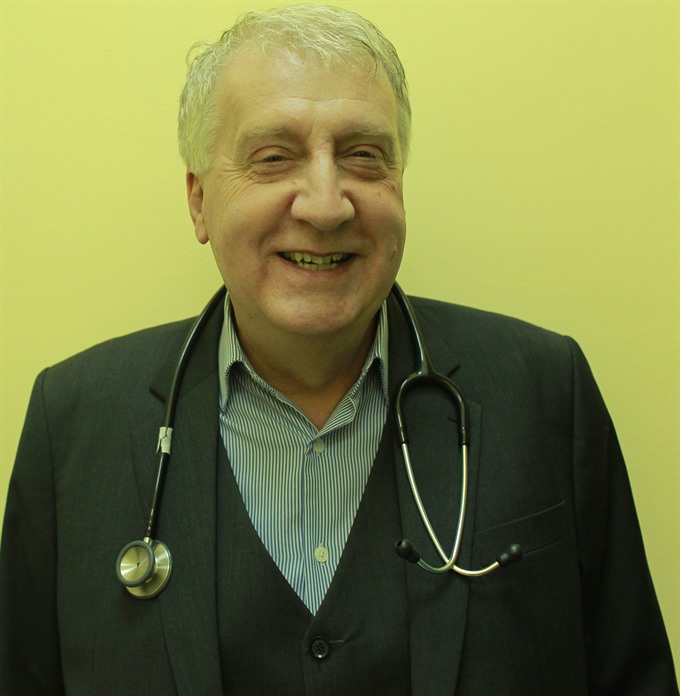The monsoon season: beware infectious disease
There may be greater risk of certain diseases during and after the monsoon rain in Viet Nam (June through October). The monsoon rains have come, especially to north and central Viet Nam and with them increased incidence of water and mosquito-borne disease. Here are some of the most common ones.
 |
| Doctor William Brian McNaull |
Cholera: This bacterial disease is already in the ground water in the major cities of Viet Nam. Flooding, which occurs regularly after heavy monsoon rains, raises the water table and may increase the chance of contamination of vegetables and herbs by the cholera bacteria. Only about 1 in 10 infected people develop the typical signs and symptoms of cholera, which include: Severe, watery sudden onset diarrhea. Cholera diarrhea often is voluminous and may have a pale, milky appearance that resembles water in which rice has been rinsed (rice-water stool). What makes cholera diarrhea so deadly is the loss of large amounts of fluids in a short time. The main risk to health is that of rapid dehydration from fluid loss with possible shock and even death in a small percentage of cases. How can we do our best to prevent the spread of this disease?
- Washing hands: Frequent and thorough hand washing with hot, soapy water, especially before eating or preparing food, after using the toilet, and when returning from public places. Carry an alcohol-based hand sanitizer for times when water isn’t available.
- Avoid untreated water: Contaminated drinking water is the most common source of cholera infection (and other bacteria). For that reason, drink only bottled water. Carefully wipe the outside of all bottles and cans before you open them and ask for drinks without ice. Use bottled water to brush your teeth.
- Eat food that’s completely cooked and hot: Cholera bacteria can survive in room temperature food for up to five days and aren’t destroyed by freezing.
- During an outbreak, don’t eat raw or improperly cooked fish and seafood of any kind. Avoid unpasteurized dairy products.
- Make sure that all fruits and vegetables that you eat are cooked. Sterilize all leafy vegetables before consumption.
Cholera vaccine: The cholera vaccine is about 60 -70% effective, but during an outbreak is an important defense against contraction of this potentially fatal disease.
Dengue fever: Dengue fever is a disease ranging from mild to severe — caused by four related viruses spread by the Aedes mosquito. Milder dengue fever causes high fever, rash, severe headache, muscle and joint pain. More-severe but much rarer forms of the disease — dengue hemorrhagic fever and dengue shock syndrome — can additionally cause severe bleeding, a sudden drop in blood pressure (shock) and even death (very rare).
Prevention: The best way to avoid dengue fever is to avoid being bitten by mosquitoes that carry the disease. No vaccine is commonly available as yet to prevent dengue.
To reduce your risk of mosquito bites, minimize your exposure to mosquitoes:
- Avoid being outdoors at dawn, dusk and early evening, when more mosquitoes are buzzing about.
- Wear long-sleeved shirts, long pants, socks and shoes
- Stay in air-conditioned or well-screened housing.
- Apply permethrin-containing mosquito repellent to your bed netting. You can also buy clothing made with permethrin already in it.
- Use repellent with a 10 to 30 percent concentration of DEET on your skin. Choose the concentration based on the hours of protection you need — a 10 percent concentration of DEET is effective for about two hours; higher concentrations last longer. However, chemical repellents can be toxic, so use only the amount needed. Don’t use DEET on the hands of young children or on infants under 2 months of age. Instead, cover your infant’s stroller or playpen with mosquito netting when outside.
- Pools of stagnant or standing water are good places for the dengue carrying mosquito (Aedes) to breed - so empty standing water in plant pots or other containers around the house.
Leptospirosis: This disease is caused by exposure to several types of the Leptospira bacteria, which can be found in fresh water that has been contaminated by animal (mainly rat) urine. Commoner in warmer climates, it is not spread from person to person. Usually infection is a result of occupational exposure -- farmers, ranchers, slaughterhouse workers, trappers, veterinarians, loggers, sewer workers, rice field workers, and military personnel. But severe floods can kill rats and the risk of water contaminated by bacterial spirochetes from the rats is higher. Symptoms can take two to 26 days (average 10 days) to develop, and may include: dry cough, fever, headache, muscle pain, nausea, vomiting, diarrhea and shaking chills. Avoid walking or wading unprotected (wear rubber boots if possible) through flood water.
Other Bacterial Infections: Other bacteria that are prevalent in flood water, which in turn may more easily contaminate food – bacteria such as Shigella, Typhoid, E. Coli and Campylobacter as well as viruses such as Hepatitis A, which can all cause severe gastro-intestinal symptoms. Hence pay attention to the careful washing/sterilizing of all salads and cooking all food well.— Family Medical Practice Viet Nam
|
* Doctor William Brian McNaull serves as Medical Director at Family Medical Practice Ha Noi. He brings extensive experience to the practice. For more advice on any medical topics, visit Family Medical Practice Ha Noi on 298 I Kim Ma, Ba Dinh, Tel: (024) 3843 0748 and hanoi@vietnammedicalpractice.com. FMP’s downtown HCM City location is at Diamond Plaza, 34 Le Duan, District 1; Other facilities are at: 95 Thao Dien Street, District 2. Tel: (028) 38227848. E:hcmc@vietnammedicalpractice.com FMP Da Nang is located at 96-98 Nguyen Van Linh Street, Hai Chau District, Da Nang. Tel: (0236) 3582 699. E: danang@vietnammedicalpractice.com. |
(Source: Vietnamnews)